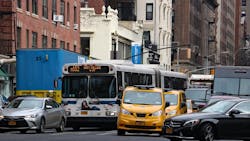Traffic Mobility Review Board report recommends tolling structure for New York’s congestion pricing program
A report produced by the Traffic Mobility Review Board recommends a tolling structure for Central Business District (CBD) Tolling, New York’s congestion pricing program. The recommendations submitted in the report will be considered on Dec. 6 by the Board of the Triborough Bridge and Tunnel Authority (TBTA), which is coterminous with the Metropolitan Transportation Authority (MTA) Board. The board will review the recommendations as it considers commencing the rate making process, which includes putting forward a proposed toll schedule for public review.
The report recommends the following:
- Passenger vehicles and passenger-type vehicles with commercial license plates should be charged a $15 toll for entering the CBD, no more than once per day.
- Trucks should be charged a $24 or $36 toll for entering the CBD, depending on their size.
- Buses providing transit or commuter services should be exempted from the toll. Other buses should be charged a $24 or $36 toll for entering the CBD, depending on their type.
- Motorcycles should be charged half the passenger vehicle toll, no more than once per day.
- Tolls should be charged to vehicles only as they enter the CBD – not if they remain in or leave the zone.
- Congestion toll rates should apply during the most congested times of the day – from 5 a.m. to 9 p.m. on weekdays and from 9 a.m. to 9 p.m. on weekends. Toll rates should be 75 percent lower in the nighttime.
- A credit against the daytime CBD toll rate should be provided to vehicles entering through the four tolled entries that lead directly into the CBD: The Queens-Midtown, Hugh L. Carey, Holland and Lincoln Tunnels. The credit should be $5 for passenger vehicles, $2.50 for motorcycles, $12 for small trucks and intercity/charter buses and $20 for large trucks and tour buses. No crossing credits should be in effect in the nighttime period when toll rates are 75 percent lower.
- NYC Taxi and Limousine Commission-licensed taxis and For-Hire Vehicles (FHVs) should be exempted from the daily system toll on vehicles. Instead, a per ride CBD toll should be added to each paid passenger trip fare for rides made to, from or within the CBD at the toll rate of $1.25 per-ride for taxis and $2.50 per-ride for app-based FHVs.
- Specialized government vehicles should be exempted from the CBD toll (in addition to emergency vehicles and vehicles transporting people with disabilities, as required by law).
- Low-income vehicle owners who qualify and register with TBTA should receive a 50 percent discount on the daytime auto toll after the first 10 trips made by that vehicle in a calendar month.
The rate making process for Central Business District toll amounts would include an open, months-long public review process similar to the public review process under the State Administrative Procedures Act (SAPA), similar to review processes regularly undertaken for MTA fare and toll increases. In addition to a series of hybrid virtual and in-person public hearings, members of the public will have a 60-day opportunity to offer comments electronically, via voicemail or mail.
Public hearings will be held in February 2024. After the conclusion of the public hearing process, the MTA Board will review input received from the public and then schedule a vote on whether to authorize TBTA to adopt a CBD toll rate schedule to allow for the start of toll collection to proceed at a date that would be announced in advance.
“I am so grateful that this all-star panel has produced an incredibly thoughtful, detailed and balanced report that points the way forward for effective implementation of congestion pricing,” said MTA Chair and CEO Janno Lieber. “Congestion pricing will mean less traffic, cleaner air, safer streets and better transit.”
While the public review process is underway, the vendor that is building out the toll system and infrastructure will continue installing the infrastructure that will be used for toll collection. As of today, 60 percent of the sites are complete.
Reactions
Tom Wright, president and CEO at Regional Plan Association, issued the following statement on the report:
"Congestion pricing will reduce congestion in the region’s traffic-choked core and raise critically-needed funds for mass transit. The policy will benefit the vast majority of commuters, residents and businesses in the region who rely on mass transit and will benefit drivers who suffer under some of the worst traffic conditions in the nation. RPA commends the Traffic Mobility Review Board for delivering a thorough set of recommendations for implementing the policy and encourages the MTA to continue moving ahead with implementation. No proposal will satisfy every constituency and we do think this proposal can be improved. In particular, the MTA Board should increase the credits being given to drivers entering the zone through a tolled facility – the Lincoln, Holland, Hugh Carey and Queens-Midtown tunnels – and extend credits to drivers using the George Washington and RFK bridges.”
“As the program advances through the State Administrative Process towards implementation next year, the MTA will need to thoroughly monitor the program and address any unforeseen issues that come up. In particular, the MTA should monitor and be transparent about how much revenue the fees generate, how transit use is impacted, the effects of the credit policy, the impact of taxi and for hire vehicle fees, the effectiveness of enforcement and how license plate abuse is being handled and the potential benefits of two way tolls and charging vehicles that begin and end their trips entirely within the zone.”
New York Rider's Alliance Policy and Communications Director Danny Pearlstein said, “Congestion pricing will be a win-win-win for transit, traffic and air quality. Riders have organized for years to make it a reality and we eagerly await its implementation. "With the Traffic Mobility Review Board report, we now have a clear picture of how to fairly fund reliable and accessible public transit for New Yorkers, commuters and visitors."
The reactions were not all positive towards the report.
“As advertised, New York is officially sticking it to Jersey families with their commuter-crushing congestion tax. On top of the existing tolls, it’ll be 15 bucks every day to go into the city with no discounts at the GW Bridge — thousands of dollars a year just to drive to work. If it wasn’t costly enough, the congestion tax will also increase toxic, cancer-causing pollution in Jersey,” said U.S. Rep. Josh Gottheimer (D-NJ-5), who formed the Congressional Anti-Congestion Tax Caucus in opposition to the proposed tolling in the Central Business District.
New Jersey Gov. Phil Murphy joined in voicing his opposition to the report and called the proposed toll pricing “unfair and ill-conceived.”
“Despite our interconnected and interdependent regional economy and transportation system, New York officials did not meaningfully consult with us from the outset and instead treated New Jerseyans as a convenient way to fill an MTA budget hole. As a conceptual matter, I support congestion pricing, as long as it is structured in a way that is fair to all sides. This plan is neither fair, nor equitable,” said New Jersey Gov. Phil Murphy. “The Traffic Mobility Review Board’s recommended credit structure is wholly inadequate, especially the total lack of toll credits for the George Washington Bridge, which will lead to toll shopping, increased congestion in underserved communities and excessive tolling at New Jersey crossings into Manhattan. Everyone in the region deserves access to more reliable mass transit but placing an unjustified financial burden on New Jersey commuters is wrong. We are left with no choice than to continue addressing our concerns through litigation.”
About the Author
Brandon Lewis
Associate Editor
Brandon Lewis is a recent graduate of Kent State University with a bachelor’s degree in journalism. Lewis is a former freelance editorial assistant at Vehicle Service Pros in Endeavor Business Media’s Vehicle Repair Group. Lewis brings his knowledge of web managing, copyediting and SEO practices to Mass Transit magazine as an associate editor. He is also a co-host of the Infrastructure Technology Podcast.

